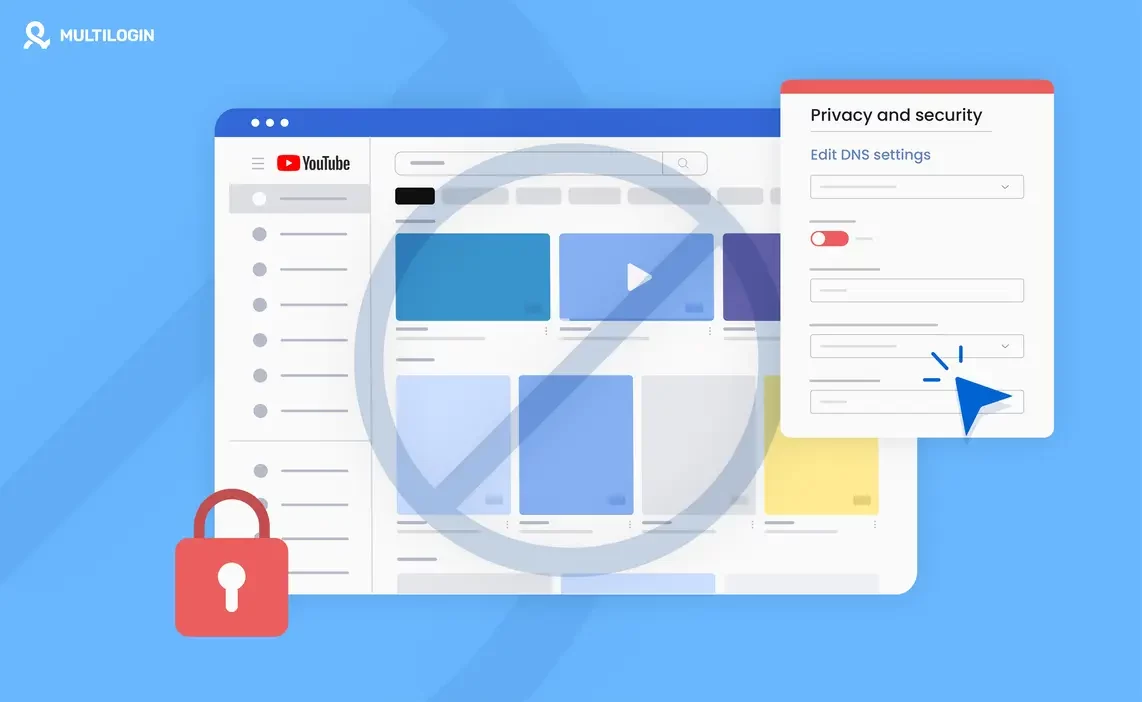Why Is YouTube Blocked in the First Place?
Understanding the “why” helps you see why simple tricks fail. Access to YouTube is typically blocked for three reasons:- Geographical Restrictions (Geo-blocking): Content creators and copyright holders often restrict their videos to specific countries due to licensing agreements. YouTube enforces this by checking your IP address.
- Network Firewalls (Schools, Workplaces): System administrators at schools and offices block YouTube to conserve bandwidth and (supposedly) improve productivity. These firewalls use sophisticated filters that go far beyond simple URL blocking.
- Government Censorship: Some countries block YouTube entirely for political or social reasons, using advanced national-level firewalls.
The Illusion of a Quick Fix: 9 Popular Tricks That Will Fail
Let’s put the most common advice to the test and see why it falls short in 2025.Trick #1: Using HTTPS Instead of HTTP
- The Idea: Manually changing the URL from http:// to https:// might bypass very old, primitive firewalls that only blocked the unencrypted version of the site.
- Why It Fails: This trick is completely obsolete. Every modern firewall and browser automatically uses HTTPS. YouTube itself forces an encrypted connection. Network filters don’t just block URLs; they block the domain (youtube.com) and its associated IP addresses, regardless of the protocol. This method has not worked for at least a decade.
Trick #2: Using a URL Shortener (Bitly, TinyURL)
- The Idea: A firewall might block youtube.com but not recognize a shortened link like bit.ly/xyz123.
- Why It Fails: Modern firewalls don’t just look at the initial URL. They perform a DNS lookup and inspect the traffic to see the final destination through URL parameter obfuscation detection. The moment you click the shortened link, the firewall sees the request is being redirected to youtube.com and blocks it instantly. This is like trying to sneak into a secure building by putting a different label on the door—the guards inside still know where you are.
Trick #3: Using Google Translate as a Proxy
- The Idea: Paste the YouTube URL into Google Translate and click the translated link. The traffic is routed through Google’s servers, masking the final destination.
- Why It Fails: While clever, this method is unreliable and offers a terrible user experience. Video playback is often broken, the site is slow, and you can’t log in. More importantly, network administrators are aware of this loophole. Many have blocked access to translation services when used as proxies or have rules to inspect the content being passed through them.
Trick #4: Changing Your DNS Settings
- The Idea: Your network’s default DNS server is what blocks YouTube. By switching to a public DNS like Google’s (8.8.8.8) or Cloudflare’s (1.1.1.1), you can bypass this block.
- Why It Fails: This only works if the block is implemented solely at the DNS level, which is extremely rare. Most modern firewalls use multiple methods, including IP address filtering and deep packet inspection. They can see you’re trying to connect to YouTube’s IP addresses through DNS leak tests, regardless of which DNS server you use. It’s a simple, easily defeated measure.
Trick #5: Using Browser Extensions (Hola, Ultrasurf)
- The Idea: These extensions act like mini-VPNs or proxies directly in your browser.
- Why It Fails: These extensions are notoriously insecure and unreliable. Many operate as peer-to-peer networks, meaning you are routing your traffic through another user’s computer—and they are routing theirs through yours. This exposes you to massive security risks and associates your IP with unknown activities. They are also slow, ad-supported, and easily detected and blocked by network administrators through browser extension detection.
Trick #6: Downloading Videos with Online Converters
- The Idea: If you can’t watch the video, just download it with a tool like y2mate.
- Why It Fails: This isn’t “unblocking YouTube”; it’s just downloading a file. It doesn’t allow you to browse, comment, or interact with the platform. Furthermore, these downloader sites are often riddled with malware, aggressive pop-up ads, and pose a significant security risk to your device.
Trick #7: Accessing YouTube via its IP Address
- The Idea: The firewall might block the domain youtube.com, but not its direct IP address.
- Why It Fails: This is another outdated trick. Modern websites, especially massive ones like YouTube, don’t run on a single IP address. They use a complex network of servers, and their web servers are configured to respond to the domain name, not the IP. In most cases, typing the IP address into your browser will simply result in an error page. Even if it did work, firewalls block IP ranges, not just domain names.
Trick #8: Using Smart DNS Services
- The Idea: A Smart DNS service reroutes only the DNS requests related to geo-blocked services, making it faster than a VPN.
- Why It Fails: Smart DNS does nothing to hide your IP address or encrypt your traffic. It’s designed for bypassing geo-blocks on devices like smart TVs, not for getting around sophisticated network firewalls at a school or workplace. Your network administrator can still see and block your connection to YouTube through DNS prefetching analysis.
Trick #9: Using the Tor Browser
- The Idea: Tor provides strong anonymity by routing your traffic through multiple volunteer-run nodes.
- Why It Fails for This Purpose: While powerful, Tor is not a practical solution for watching YouTube. The connection speed is far too slow for video streaming, resulting in constant buffering. Furthermore, many websites, including Google/YouTube, actively block traffic from known Tor exit nodes or present endless CAPTCHAs, making the experience unusable.
| Method | Unblocks YouTube? | Is it Secure? | Is it Reliable? | Is it Detectable? |
| HTTPS Trick | ❌ No | N/A | ❌ No | ✅ Yes |
| URL Shortener | ❌ No | ❌ No | ❌ No | ✅ Yes |
| Google Translate | ⚠️ Rarely | ❌ No | ❌ No | ✅ Yes |
| DNS Change | ⚠️ Rarely | ❌ No | ❌ No | ✅ Yes |
| Browser Extensions | ⚠️ Sometimes | ❌ No | ❌ No | ✅ Yes |
| Video Downloader | ⚠️ For one video | ❌ No | ⚠️ Partially | N/A |
| IP Address Trick | ❌ No | N/A | ❌ No | ✅ Yes |
| Smart DNS | ⚠️ For geo-blocks only | ❌ No | ⚠️ Partially | ✅ Yes |
| Tor Browser | ⚠️ Rarely (unusable) | ✅ Yes | ❌ No | ✅ Yes |
The Professional Solution: How to Actually Unblock YouTube in 2025
To reliably bypass modern restrictions, you need to solve two problems simultaneously:- Your IP Address: It reveals your location and is the first thing a firewall checks
- Your Browser Fingerprint: It reveals your device and system details, allowing platforms to identify you even without an IP through browser fingerprinting
A Simple 3-Step Guide to Guaranteed YouTube Access
Step 1: Create a New Browser Profile in Multilogin Think of this as creating a new, virtual computer. You can choose the operating system (Windows, macOS, Linux) and browser type (Chrome or Firefox). Multilogin automatically assigns a unique, natural browser fingerprint through advanced device emulation. Step 2: Assign a High-Quality Residential Proxy This is the most crucial step. Instead of a detectable VPN or a risky free proxy, Multilogin integrates with Nodemaven, our premium residential proxy service. You can select a clean, private IP address from a real home internet connection in any country you want (e.g., the USA to watch geo-blocked content). Step 3: Launch and Browse Click “Start,” and a new browser window opens. To YouTube, you now look like a completely normal user browsing from a real home in your chosen country. The block is gone. Access is guaranteed, secure, and fast enough for 4K streaming.Beyond Unblocking: Professional Use Cases for YouTube
Multilogin isn’t just for watching blocked videos. It’s a powerful business tool for professionals who rely on the YouTube platform.- Manage Multiple YouTube Channels: Run several YouTube channels for different brands or niches from a single computer without them ever being linked. A ban on one channel won’t affect the others.
- Ad Verification: As a marketer, you can check how your company’s ads are being displayed to users in different countries, ensuring they are compliant and effective.
- Market Research: Analyze what’s trending in different regions, study competitor channels, and understand local audience preferences by appearing as a native user.
- Content Strategy: Test how your content performs and is recommended when viewed from different locations and demographics.
Frequently Asked Questions About Unblocking YouTube
Can I unblock YouTube without a VPN?
Yes, you can unblock YouTube without a VPN using methods like changing DNS settings, using Google Translate, or accessing YouTube via its IP address.
Is using a proxy for YouTube safe?
Using a proxy for YouTube is generally safe, but free proxies may have privacy concerns. Ensure you’re using a trustworthy service, like Multilogin’s residential and dedicated YouTube proxies to protect your data.
How do I unblock YouTube at school?
To unblock YouTube at school, you can try using a URL shortener, Google Translate, or changing your DNS settings to public DNS servers like Google’s.
Can I access YouTube through a DNS server?
Yes, changing your DNS settings to use public DNS servers like Google DNS (8.8.8.8) or Cloudflare DNS (1.1.1.1) can help you unblock YouTube.
Is it illegal to unblock YouTube at work?
It depends on your company’s policies. While unblocking YouTube is not illegal, it could go against workplace rules and result in consequences if caught.
Need a YouTube Proxy That Works? Try Multilogin!
Stop Using Tricks, Start Using Tools
The age of simple tricks and loopholes is over. Network filters and platform security have become too intelligent to be fooled by URL shorteners or DNS changes. Continuing to use these outdated methods is not only ineffective but also risky.
For casual users, the frustration of a blocked video is temporary. But for professionals, reliable and secure access to global platforms like YouTube is a business necessity. You cannot build a business on a foundation of unreliable “tricks.”
It’s time to stop thinking about how to “trick” the system and start using a professional tool designed to navigate it. Multilogin provides the only truly reliable method for bypassing restrictions by giving you what you actually need: a new, authentic digital identity with proper stealth browsing capabilities.
Ready for guaranteed, unrestricted access to YouTube and any other platform?
Start your Multilogin plan now and see the difference a professional tool makes.


